Best Guide to Data Center Construction Management Software: Manage Scheduling, Deliveries, and Compliance for Hyperscale Projects
Table of Contents:

In the rapidly growing data center industry, managing construction projects requires precision, adaptability, and advanced solutions. From coordinating critical deliveries to optimizing multi-tier schedules, data center construction is no small task. The stakes are high—tight timelines, remote locations, and complex regulatory requirements demand construction management tools that deliver efficiency and accuracy. This guide explores the strategies, tools, and practices that can revolutionize data center construction management.
Data Center Construction Delivery Management: Real-Time Tracking Solutions for Data Center Components
Deliveries are the lifeblood of any construction project, but in data center construction, where precision is paramount, real-time tracking takes on even greater importance. Tracking tools ensure that essential components, from cooling units to backup power systems, arrive on time and in the right condition, keeping projects on schedule. As hyperscale data centers rely on just-in-time (JIT) procurement and complex vendor coordination, any delay in component delivery can create cascading disruptions across multiple workstreams.
Delays in deliveries can ripple across an entire project, causing bottlenecks in scheduling and resource allocation. A delayed shipment of electrical infrastructure, for example, can stall power distribution installations, preventing IT equipment deployment and forcing teams to reschedule labor resources, resulting in wasted time and increased costs. With real-time tracking tools, project managers gain visibility into every stage of the delivery process, enabling proactive adjustments to avoid disruptions. These tools also foster better communication with suppliers, subcontractors, and logistics teams, ensuring accurate inventory management and preventing supply chain surprises.
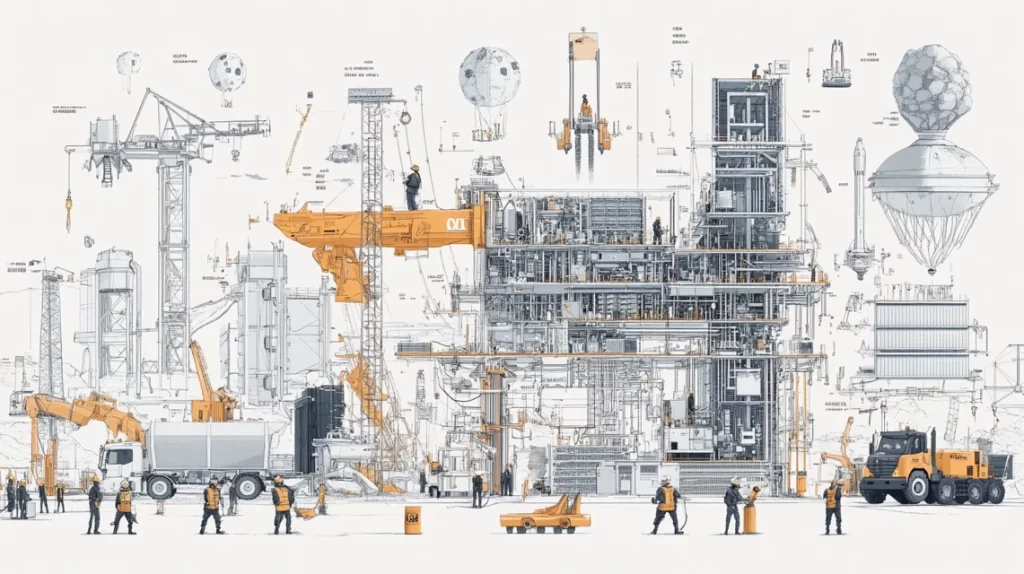
Another critical advantage of real-time tracking in data center construction is risk mitigation. Weather conditions, transportation delays, or unexpected shortages can all impact delivery schedules. With GPS-enabled logistics tracking and AI-driven analytics, construction teams can anticipate potential disruptions, reroute shipments when necessary, and adjust scheduling dynamically. This proactive approach allows managers to make real-time decisions rather than reacting to problems after they cause costly delays.
Additionally, tracking integrations with construction management platforms like StruxHub enhance coordination by automatically updating schedules, notifying teams of expected delivery times, and ensuring immediate verification upon arrival. This minimizes errors related to incorrect shipments, missing materials, or damaged components, allowing for rapid resolution before these issues slow down critical project phases. With smart tracking solutions, data center construction teams can achieve seamless logistics, optimized resource allocation, and improved efficiency, ensuring that every component arrives exactly when and where it’s needed.
Top Features
- Live Tracking Dashboards: Provide real-time updates on shipment locations.
- Automated Notifications: Alert teams to delays or changes in delivery status.
- Integration with Inventory Systems: Sync deliveries with on-site material tracking.
- Vendor Collaboration Tools: Enable direct communication with suppliers for streamlined coordination.
- Geo-Fencing Technology: Trigger notifications when materials are close to the construction site.
Top Benefits
- Reduced Delays: Prevent bottlenecks by addressing delivery issues proactively.
- Improved Communication: Keep all stakeholders informed about shipment progress.
- Enhanced Efficiency: Align deliveries with project schedules for seamless workflows.
- Cost Control: Minimize unexpected expenses from missed or delayed shipments.
- Transparency: Build trust with stakeholders through clear and consistent updates.
Related Articles
- Data Center Construction Deliveries: Best Real-Time Tracking Solutions for Managing Data Center Construction Deliveries
- Data Center Construction: Top Delivery and Scheduling Strategies for Redundant Power Systems in Data Centers

Data Center Construction Scheduling: Simplifying Multi-Tier Timelines for Hyperscale Data Center Builds
Hyperscale data center projects are complex, with overlapping phases and tight deadlines. Effective scheduling is essential for coordinating tasks, workforce, and equipment without wasting resources or extending timelines. Unlike traditional construction, where each phase follows a linear progression, data center builds require multi-tier scheduling that allows multiple teams to work simultaneously while avoiding bottlenecks. A well-structured schedule ensures that infrastructure deployment, electrical and mechanical installations, and IT equipment integration occur in a synchronized manner, keeping the project on track.
Dynamic scheduling tools streamline multi-tier timelines by automating task dependencies, accounting for weather conditions, and integrating real-time updates. These solutions ensure that each phase of construction aligns with the overall project goals, reducing downtime and improving resource utilization. Advanced scheduling platforms allow project managers to adjust work sequences in real time, reallocating resources when necessary to maintain momentum. If a delay occurs in one phase, such as a shipment setback or unforeseen site issue, automated scheduling adjustments can reassign tasks to keep other aspects of the project moving forward.

Another key advantage of modern scheduling tools is improved workforce efficiency. Managing multiple contractors, engineers, and specialized technicians across different phases of construction requires precise coordination. Without a clear scheduling system, labor resources can be underutilized or, conversely, overscheduled, leading to inefficiencies and increased costs. By integrating workforce scheduling with supply chain tracking and project timelines, teams can ensure that skilled labor is allocated exactly where and when it is needed.
Construction management platforms like StruxHub enhance scheduling by providing real-time data visibility, automating task prioritization, and ensuring that interdependent tasks align seamlessly. With predictive analytics, these systems can anticipate potential conflicts before they arise, allowing project managers to resolve issues proactively rather than reacting to problems after they cause delays. By adopting a streamlined scheduling approach, hyperscale data center construction teams can minimize risks, optimize resources, and accelerate project completion.
Top Features
- Task Dependency Management: Map out task relationships to prevent bottlenecks.
- Real-Time Adjustments: Automatically update schedules as conditions change.
- Weather Impact Analysis: Factor weather forecasts into construction plans.
- Resource Allocation Insights: Optimize workforce and equipment usage.
- Milestone Tracking: Monitor progress against critical project benchmarks.
Top Benefits
- Enhanced Productivity: Keep tasks synchronized for smooth workflows.
- Reduced Delays: Anticipate potential disruptions and adjust proactively.
- Improved Communication: Ensure all teams understand their roles and timelines.
- Scalability: Manage both small-scale and hyperscale projects effectively.
- Stakeholder Confidence: Deliver projects on time and within scope.
Related Articles
- Data Center Construction Scheduling: Best Workforce Scheduling Strategies to Improve Productivity in Data Center Construction
- Data Center Construction Delivery Coordination: Efficient Scheduling Strategies for Modular Data Center Equipment Installations
- Hyperscale Data Center Construction: How to Simplify Multi-Tier Scheduling for Hyperscale Data Center Construction
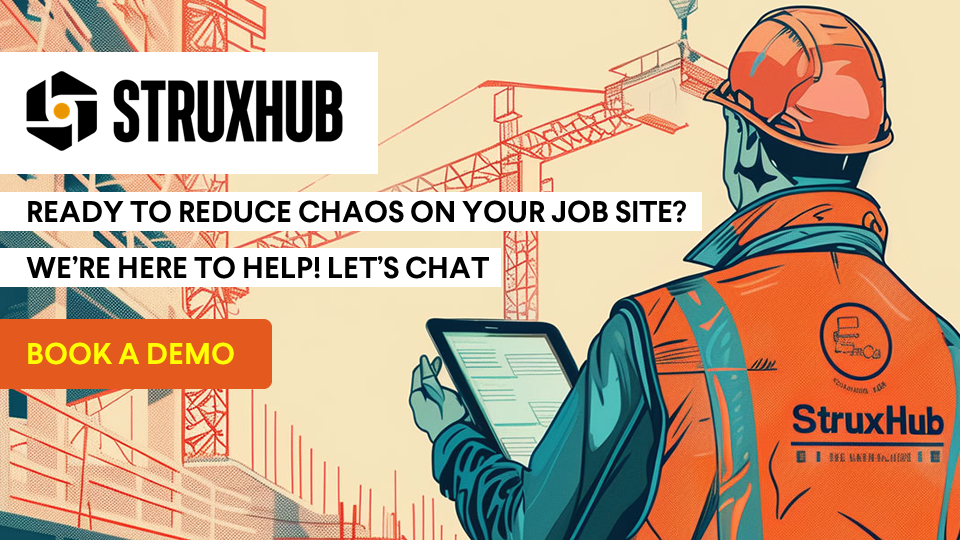
Data Center Construction Compliance: Tools for Streamlining Permits and Certifications in Data Center Construction
Navigating compliance requirements is a critical aspect of data center construction. With stringent regulations governing environmental impact, safety standards, and energy efficiency, managing permits and certifications efficiently can make or break a project. Compliance failures can lead to costly delays, fines, and even project shutdowns, making it essential to implement structured compliance management from the earliest planning stages. Unlike smaller-scale construction projects, data center builds must adhere to multiple overlapping regulations, including zoning laws, building codes, electrical safety standards, and sustainability certifications.
Digital compliance tools centralize documentation, track deadlines, and provide automated reminders for regulatory submissions. These solutions reduce the risk of errors and ensure that data center projects meet all legal and environmental standards without delays. Instead of relying on manual paperwork and outdated tracking methods, project managers can leverage cloud-based compliance platforms to streamline the entire process. These systems allow teams to store permits, certifications, and inspection reports in a centralized location, ensuring that critical compliance documents are readily accessible for audits and regulatory reviews.

One of the biggest challenges in data center compliance is managing the approvals process for multiple regulatory bodies. From local building authorities to environmental agencies, each approval requires specific documentation, inspections, and adherence to industry standards. Automated compliance tracking tools help by flagging upcoming deadlines, reducing the likelihood of missed filings, and minimizing the administrative burden on project teams. Additionally, digital workflow automation ensures that approvals are submitted in the correct order, preventing bottlenecks caused by incomplete documentation.
Construction management platforms like StruxHub integrate compliance tracking with scheduling and project execution, ensuring that regulatory approvals align with construction milestones. By integrating real-time compliance monitoring, teams can quickly identify potential risks, address inspection requirements proactively, and maintain project momentum. With streamlined compliance management, data center developers can reduce regulatory risks, avoid costly penalties, and ensure a smooth transition from construction to operation.
Top Features
- Centralized Document Storage: Maintain all compliance-related documents in a secure repository.
- Automated Deadline Tracking: Receive reminders for permit renewals and certifications.
- Version Control: Ensure teams work with the latest regulatory documents.
- Audit Trails: Maintain records of document changes for accountability.
- Mobile Access: Access compliance documents from any location.
Top Benefits
- Increased Accuracy: Reduce errors in regulatory documentation.
- Time Savings: Automate manual compliance tracking tasks.
- Reduced Risk: Avoid fines and project delays caused by non-compliance.
- Enhanced Transparency: Build stakeholder trust with clear audit trails.
- Simplified Collaboration: Share documents seamlessly across teams.
Related Articles
- Data Center Construction Compliance: Top Tools for Streamlining Permits and Compliance in Data Center Construction
- Sustainable Data Center Construction: Best Green Building Practices for Sustainable and Mission-Critical Data Center Construction
Construction Field Operations Management: Solving Workforce Coordination Challenges in Remote Data Centers
Remote data center construction sites often pose unique challenges, from limited connectivity to scattered teams working across vast geographical areas. Unlike urban construction projects, where resources and personnel are readily available, remote sites require precise workforce coordination to ensure efficiency, maintain productivity, and prevent delays. Managing logistics, labor schedules, and communication between on-site teams, off-site project managers, and multiple subcontractors can quickly become overwhelming without the right tools.
Field operations management tools bridge these gaps by enabling real-time communication, tracking workforce productivity, and ensuring that on-site activities align with broader project goals. These solutions help project managers allocate labor resources effectively, monitor performance metrics, and keep all stakeholders updated on project milestones. By integrating cloud-based field operations platforms, teams can track attendance, log completed tasks, and report incidents in real time, preventing delays caused by manual reporting errors.

One of the biggest obstacles in managing remote data center construction is the lack of instant access to project data. Traditional field reports often require manual updates and offline documentation, which can lead to miscommunications and scheduling inefficiencies. Modern mobile-friendly field management platforms allow on-site crews to update progress, access digital blueprints, and receive task assignments instantly, even in areas with limited connectivity. These platforms sync automatically when an internet connection is available, ensuring that data remains current across all project stakeholders.
Another critical aspect of remote workforce coordination is safety management. Field teams must adhere to strict safety protocols, and ensuring compliance in remote locations can be challenging. Digital safety checklists, automated incident reporting, and real-time hazard alerts help teams stay compliant with OSHA and industry-specific safety regulations. Additionally, geolocation tracking ensures that managers can monitor worker locations, ensuring optimal task allocation and rapid response in case of emergencies.
Platforms like StruxHub enhance workforce coordination by connecting on-site and off-site teams through a centralized dashboard. These solutions streamline scheduling, automate reporting, and integrate real-time communication tools, making it easier for remote teams to stay aligned with project goals. By adopting a tech-driven approach to field operations management, data center construction teams can enhance productivity, improve safety compliance, and ensure seamless collaboration across dispersed teams.
Top Features
- Mobile Access: Equip field teams with on-the-go access to schedules, plans, and updates.
- Workforce Tracking: Monitor team productivity and on-site activity in real time.
- Document Sharing: Instantly share updated project documents with field staff.
- Incident Reporting Tools: Address safety concerns or disruptions immediately.
- Integrated Reporting Dashboards: Provide visibility into field operations for decision-makers.
Top Benefits
- Improved Collaboration: Align field and office teams seamlessly.
- Reduced Errors: Ensure accurate and timely updates across teams.
- Enhanced Safety: Monitor and respond to on-site issues promptly.
- Increased Efficiency: Eliminate redundant tasks with real-time data sharing.
- Cost Savings: Avoid miscommunications that lead to project delays.
Related Articles
- Data Center Construction Field Operations Management: Optimize Efficiency & Remote Coordination
- Data Center Construction Crew Scheduling: How Superintendents Can Optimize Team Productivity on Complex Data Center Projects

Efficient Material Tracking for Data Center Construction Projects
Timely delivery of materials is the backbone of data center construction. However, ensuring materials are not misplaced or delayed can be challenging, especially for large-scale projects with multiple stakeholders. With thousands of components required for electrical, mechanical, and IT infrastructure, even a minor delay in essential materials like fiber optic cabling, power distribution units, or cooling systems can cause a ripple effect throughout the construction timeline. Keeping materials organized and ensuring they arrive on-site precisely when needed requires a structured and technology-driven approach to supply chain management.
Material tracking solutions bring transparency to the supply chain, providing project managers with real-time updates and actionable insights. These tools allow teams to monitor shipments at every stage, from supplier dispatch to on-site arrival, reducing the risk of lost or misplaced materials. By implementing real-time tracking, project managers can anticipate potential disruptions, adjust schedules proactively, and coordinate with vendors to resolve delivery issues before they impact critical project phases. This level of visibility helps prevent over-ordering, ensures that materials are used efficiently, and reduces unnecessary storage costs by aligning inventory with project demand.
Another advantage of material tracking solutions is their ability to integrate with broader construction management platforms. When tracking systems are linked to scheduling software, teams can automatically adjust workflows based on material availability. If a shipment of electrical panels is delayed, for example, the system can notify relevant teams and adjust labor assignments to focus on other tasks, minimizing downtime. Additionally, digital inventory management helps prevent shortages by providing alerts when stock levels run low, ensuring that essential materials are reordered before they become a bottleneck in the construction process.

By integrating tracking tools into their workflows, construction teams can prevent delays, optimize resource use, and maintain steady progress toward project completion. These solutions not only improve efficiency but also enhance collaboration between suppliers, logistics teams, and on-site personnel. With material tracking playing a crucial role in maintaining project timelines, data center developers can ensure that all necessary components are available when and where they are needed, reducing risks and keeping projects on schedule.
Top Features
- Live Shipment Monitoring: Track the exact location of materials in real time.
- Inventory Alerts: Notify teams of low inventory or excess stock automatically.
- Geo-Tagging Tools: Pinpoint material deliveries to specific project zones.
- Integration with Delivery Schedules: Align material tracking with construction timelines.
- Customizable Dashboards: Provide tailored insights into supply chain efficiency.
Top Benefits
- Minimized Delays: Avoid project interruptions caused by material shortages or misplaced deliveries.
- Improved Communication: Foster better collaboration between suppliers and project managers.
- Increased Transparency: Provide stakeholders with clear visibility into material logistics.
- Optimized Resource Allocation: Ensure materials are ready for use when needed.
- Cost Savings: Eliminate wasted resources and reduce unexpected shipping expenses.
Related Articles
Simplifying Multi-Phase Scheduling for Hyperscale Data Centers
Managing schedules for multi-phase construction projects requires precision and adaptability. Hyperscale data centers, with their immense scale and intricate timelines, depend on advanced scheduling tools to coordinate overlapping tasks and workforce demands efficiently. Unlike smaller-scale projects, where tasks follow a more linear sequence, hyperscale data centers require parallel workstreams that must be synchronized to avoid bottlenecks. Electrical infrastructure, cooling systems, network cabling, and structural components must all be installed in carefully orchestrated phases to prevent workflow conflicts and resource misallocation.
Dynamic scheduling solutions provide construction managers with the flexibility to adjust timelines based on project progress, weather conditions, or unforeseen delays. A rigid, static schedule can create inefficiencies, as real-world construction rarely follows an exact timeline. By implementing automated scheduling platforms, teams can track progress in real time, anticipate risks, and shift resources to priority tasks as needed. For instance, if an unexpected material delay affects electrical installations, the system can adjust schedules automatically, reassigning workers to other critical tasks to keep the project moving forward.

Another key benefit of multi-phase scheduling tools is workforce optimization. Hyperscale data center construction requires large teams of specialists working simultaneously across multiple job sites. Without proper scheduling, labor shortages or scheduling overlaps can reduce productivity and increase project costs. Workforce planning integrations help managers distribute labor efficiently, ensuring that skilled workers are available at the right time and location without unnecessary downtime.
By integrating these tools, teams can ensure smooth transitions between phases, optimize workforce productivity, and maintain project momentum. Platforms designed for hyperscale construction scheduling provide real-time visibility, automated milestone tracking, and predictive analytics, allowing project managers to make informed decisions. As data center construction projects continue to scale, adopting dynamic scheduling solutions will be critical for improving efficiency, reducing risks, and delivering facilities on time and within budget.
Top Features
- Phase-Specific Task Management: Organize schedules by project phases to minimize confusion.
- Automated Adjustments: Adapt schedules dynamically in response to real-time data.
- Critical Path Visualization: Highlight dependencies to prioritize key tasks.
- Workforce Planning Integration: Align schedules with team availability for maximum efficiency.
- Progress Tracking Tools: Monitor milestone completion and adjust timelines as needed.
Top Benefits
- Enhanced Productivity: Keep every team member aligned with the project timeline.
- Fewer Delays: Identify and resolve potential scheduling conflicts early.
- Increased Scalability: Manage hyperscale projects effectively with phase-specific workflows.
- Improved Resource Utilization: Ensure labor and equipment are allocated optimally.
- Stakeholder Confidence: Deliver on commitments with clear and achievable timelines.
Related Articles
- Hyperscale Data Centers: Optimizing Multi-Tier Construction Scheduling for Seamless Project Execution
- Integrated Workforce Scheduling: Enhancing Team Productivity in Data Center Projects

Streamlined Regulatory Compliance for Data Centers
Regulatory compliance in data center construction can be a complex and time-consuming process. From environmental regulations to safety certifications, construction managers must navigate a web of requirements to keep projects on track and avoid costly penalties. Streamlined compliance tools are invaluable in this regard.
By automating document submission, tracking renewal deadlines, and centralizing records, compliance tools eliminate manual processes and ensure teams meet regulatory standards effortlessly. These tools allow project managers to focus on execution without the constant worry of missing crucial compliance steps.
Regulatory compliance in data center construction can be a complex and time-consuming process. From environmental regulations to safety certifications, construction managers must navigate a web of requirements to keep projects on track and avoid costly penalties. Streamlined compliance tools are invaluable in this regard.
By automating document submission, tracking renewal deadlines, and centralizing records, compliance tools eliminate manual processes and ensure teams meet regulatory standards effortlessly. These tools allow project managers to focus on execution without the constant worry of missing crucial compliance steps.
One of the most significant challenges in regulatory compliance is staying ahead of evolving industry regulations. Data centers must adhere to strict Uptime Institute Tier Certifications, ANSI/TIA-942 standards, ASHRAE cooling guidelines, and energy efficiency mandates. With regulations frequently updated to accommodate new sustainability requirements and technological advancements, manual tracking methods can quickly become outdated. Implementing AI-driven compliance tracking software helps teams stay proactive, automatically flagging regulatory changes and ensuring that all permits and safety protocols are current.
Beyond tracking and automation, compliance integration with project management systems enhances transparency and efficiency. When compliance documentation is linked directly to construction schedules, teams can receive real-time alerts when specific certifications or permits are required before advancing to the next phase. This reduces the risk of costly rework caused by compliance oversights. Additionally, centralized cloud-based compliance repositories ensure that auditors, inspectors, and project stakeholders have immediate access to the latest documentation, reducing delays during regulatory reviews.
With compliance playing a critical role in data center construction, leveraging modern compliance management solutions reduces risks, improves operational efficiency, and ensures seamless project execution. By integrating compliance into everyday workflows rather than treating it as an afterthought, teams can prevent regulatory setbacks, maintain industry standards, and accelerate project completion timelines.
Top Features
- Deadline Alerts: Notify teams of upcoming permit or certification expirations.
- Centralized Documentation: Store all regulatory documents in an easily accessible repository.
- Compliance Checklists: Provide step-by-step guides for meeting regulatory requirements.
- Audit-Ready Records: Maintain complete logs of compliance activities for transparency.
- Mobile Access: Access documents and compliance tools on-site or in the office.
Top Benefits
- Time Savings: Automate tedious manual processes, freeing up time for critical tasks.
- Reduced Risk: Avoid fines or shutdowns due to missed compliance deadlines.
- Improved Accuracy: Minimize errors in regulatory submissions with automated workflows.
- Increased Stakeholder Trust: Build confidence with clients by ensuring full compliance.
- Seamless Collaboration: Enable multiple teams to work on compliance tasks without confusion.
Related Articles
Overcoming Workforce Management Challenges in Remote Data Center Projects
Remote locations often come with unique challenges, especially in workforce coordination. Limited connectivity, large site areas, and diverse teams require advanced tools to keep everyone aligned. Workforce management solutions tackle these challenges head-on, ensuring teams stay productive and connected.
With features like mobile access, task tracking, and real-time reporting, workforce management tools enable field teams to collaborate seamlessly with office staff. These solutions enhance productivity, minimize errors, and improve overall project efficiency.
One of the biggest workforce challenges in remote data center construction is communication breakdowns. Without reliable networks or centralized coordination, teams may struggle to receive updates on safety protocols, schedule changes, or task assignments. Workforce management software bridges this gap by enabling offline data entry and automated sync capabilities once connectivity is restored. This ensures that even in areas with poor network coverage, workers remain informed and operational efficiency is maintained.

Additionally, tracking workforce performance and labor allocation is crucial for optimizing productivity on large-scale remote projects. Without real-time visibility, project managers may experience delays due to understaffing, task duplication, or inefficient resource distribution. Workforce management tools help teams analyze labor trends, assign personnel based on skill sets, and monitor task completion rates, ensuring that each phase of the project progresses smoothly.
Another critical aspect of workforce management in remote data center projects is compliance and safety monitoring. Workers operating in harsh environmental conditions or high-risk zones require strict adherence to safety guidelines. Workforce management platforms integrate automated compliance checklists, incident reporting tools, and digital safety briefings, helping teams maintain OSHA standards and industry regulations without manual paperwork.
By leveraging workforce management technology, data center construction teams can overcome the logistical and operational hurdles of remote sites, ensuring greater efficiency, improved worker safety, and seamless coordination between field and office staff.
Top Features
- Task Assignment Tools: Distribute responsibilities efficiently across teams.
- Real-Time Reporting: Track workforce performance and progress in the field.
- Mobile Compatibility: Allow teams to access schedules and update tasks on the go.
- Incident Reporting Features: Log safety issues or delays directly from the site.
- Team Communication Platforms: Foster collaboration between remote and office teams.
Top Benefits
- Improved Productivity: Equip teams with the tools they need to succeed.
- Reduced Miscommunication: Ensure clear task delegation and reporting across all stakeholders.
- Enhanced Safety: Respond to incidents promptly with integrated reporting.
- Cost Efficiency: Avoid delays caused by uncoordinated labor activities.
- Better Collaboration: Bridge the gap between on-site teams and project managers.
Related Articles
- Construction Logistics Planning: Overcoming Bottlenecks in Large-Scale Data Center Deliveries
- Integrated Workforce Scheduling: Enhancing Team Productivity in Data Center Construction
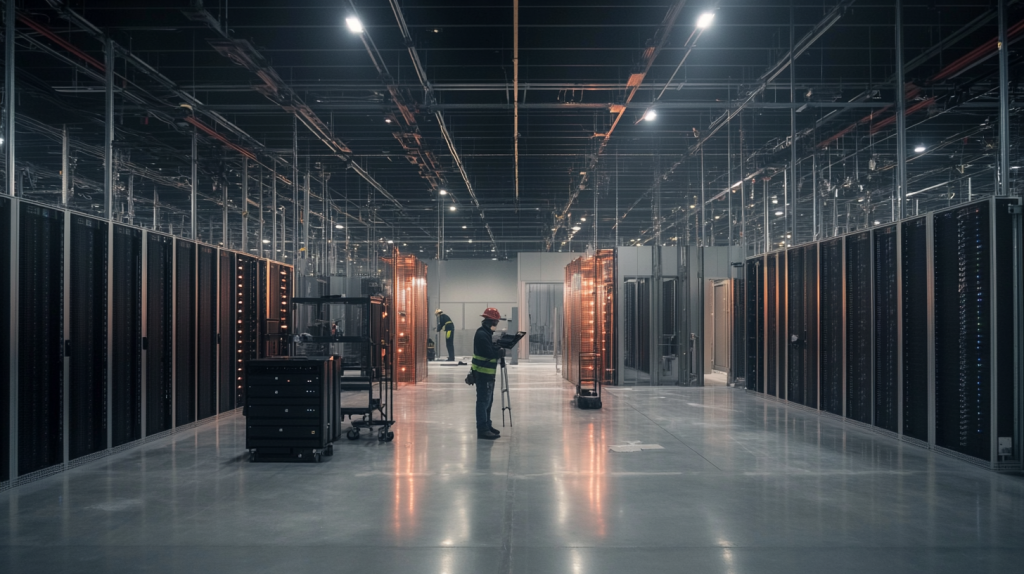
Solving Logistics Challenges in Data Center Construction
Data center construction projects often involve transporting large, sensitive equipment to remote or urban sites. Managing logistics efficiently is essential to ensure materials arrive on time and in pristine condition. Advanced logistics tools provide project managers with end-to-end visibility into transportation schedules, vendor coordination, and inventory levels.
Whether it’s addressing last-mile delivery challenges or optimizing warehouse operations, these tools keep projects running smoothly. By integrating logistics planning into the broader construction management framework, teams can mitigate risks, reduce costs, and maintain tight schedules.
One of the key logistics hurdles in data center construction is navigating delivery constraints at remote or congested urban sites. Traffic regulations, road restrictions, and tight construction zones often require specialized transportation planning to ensure oversized equipment, such as generators or cooling units, can be delivered safely. Logistics management platforms help teams track shipments in real time, coordinate with local authorities, and adjust delivery schedules dynamically to prevent unexpected delays.
Another critical factor is damage prevention during transit and storage. Many OFCI (Owner-Furnished, Contractor-Installed) components are highly sensitive to vibration, temperature fluctuations, or improper handling. Implementing GPS-tracked shipments, climate-controlled storage, and detailed handling protocols ensures that critical equipment arrives undamaged and installation-ready. Regular logistics audits and vendor performance tracking further improve delivery accuracy and reliability.
Additionally, material staging and on-site inventory tracking play a crucial role in avoiding construction bottlenecks. Without a structured system, shipments can become misplaced, stored incorrectly, or delayed at customs. Integrating RFID tagging, automated check-in/check-out systems, and cloud-based inventory databases provides project managers with real-time access to material locations, ensuring smooth installation sequencing.
By adopting smart logistics solutions, data center construction teams can reduce risks, improve supply chain efficiency, and ensure that all critical materials arrive exactly when and where they are needed—keeping projects on schedule and within budget.
Top Features
- Delivery Route Optimization: Plan efficient transportation routes to reduce travel time and costs.
- Vendor Communication Portals: Enable seamless collaboration with suppliers and transport providers.
- Inventory Management Systems: Track incoming and outgoing materials in real-time.
- Last-Mile Delivery Tools: Ensure materials reach even the most challenging construction sites.
- Automated Alerts: Notify teams of delays, damaged goods, or schedule changes immediately.
Top Benefits
- Reduced Delays: Keep projects on schedule by addressing logistical hurdles proactively.
- Improved Material Handling: Protect sensitive components during transport.
- Enhanced Cost Control: Optimize routes and minimize unnecessary shipping expenses.
- Better Supplier Relationships: Foster trust through clear communication and efficient planning.
- Increased Project Visibility: Access logistics data in real-time for informed decision-making.
Related Articles
- Efficient Material Tracking for Data Center Construction Projects
- Construction Delivery Coordination: Scheduling Tools for Modular Data Center Builds
Sustainable Practices in Data Center Construction
Sustainability is more than a buzzword—it’s a necessity in modern data center construction. Green initiatives not only reduce environmental impact but also align with the increasing demand for energy-efficient and eco-friendly infrastructure. Sustainable practices in construction involve optimizing material usage, reducing waste, and integrating renewable energy systems.
Digital tools make sustainable construction more achievable by tracking energy consumption, optimizing workflows, and monitoring compliance with green building standards. These practices not only benefit the environment but also improve project efficiency and reduce long-term operational costs.
One of the biggest challenges in sustainable data center construction is minimizing carbon footprints while maintaining high-performance infrastructure. Traditional data center builds consume significant amounts of energy and materials, making it critical to implement eco-friendly building materials, energy-efficient cooling systems, and innovative waste reduction strategies. Many developers are now prioritizing modular construction techniques, which allow for pre-fabricated, reusable components that reduce on-site waste and lower emissions from material transport.
In addition to materials, water and energy efficiency play a crucial role in sustainability. Data centers are known for their high water usage in cooling operations, but modern designs incorporate liquid cooling systems and recycled water loops to cut down on resource consumption. Meanwhile, solar, wind, and geothermal energy integration help reduce reliance on fossil fuels, contributing to greener data center operations. Green building certifications, such as LEED and BREEAM, ensure compliance with environmental standards while enhancing long-term sustainability.

Another essential element of sustainable data center construction is real-time monitoring and automation. AI-powered energy management systems analyze power usage, optimize cooling strategies, and detect inefficiencies to maintain an eco-friendly operational model. Additionally, smart building designs with adaptive lighting, temperature regulation, and predictive maintenance systems help extend the lifespan of infrastructure while minimizing waste.
By embracing sustainable construction practices, data center developers can reduce operational costs, enhance energy efficiency, and meet growing environmental regulations—all while building facilities that support the next generation of digital infrastructure.
Top Features
- Energy Consumption Metrics: Track the environmental impact of construction activities.
- Recyclable Material Tracking: Monitor and optimize the use of recyclable and sustainable materials.
- Waste Reduction Dashboards: Identify and minimize construction waste at every phase.
- Green Certification Tools: Ensure compliance with LEED or other sustainability standards.
- Renewable Energy Integration Planning: Align solar or wind energy systems with project goals.
Top Benefits
- Reduced Carbon Footprint: Minimize the environmental impact of construction projects.
- Improved Efficiency: Save costs and resources by reducing material waste.
- Enhanced Reputation: Demonstrate commitment to sustainability, building trust with stakeholders.
- Long-Term Savings: Lower operational costs with energy-efficient building practices.
- Regulatory Compliance: Meet or exceed green building standards seamlessly.
Related Articles
- Sustainable Construction Practices: Integrating Green Initiatives in Mission-Critical Data Center Builds

Data Center Construction Management Software for Edge and Hyperscale Projects
Hyperscale data centers require robust construction management solutions capable of handling their massive scale and complexity. From resource allocation to compliance management, these tools are indispensable for delivering projects efficiently and within scope.
With advanced construction management systems, project managers can integrate scheduling, delivery tracking, and workforce coordination into a single, streamlined platform. These tools ensure all stakeholders are aligned, resources are optimized, and potential risks are mitigated before they escalate.
One of the primary challenges in hyperscale data center construction is managing the sheer volume of tasks, materials, and personnel across multiple workstreams. Unlike traditional builds, hyperscale projects require simultaneous execution of civil, mechanical, electrical, and IT infrastructure, demanding precise coordination. Advanced construction management platforms provide real-time scheduling updates, automated task assignments, and integrated milestone tracking, ensuring that no phase of construction falls behind.
Additionally, supply chain complexity in hyperscale projects requires advanced logistics tracking to prevent delivery bottlenecks and storage inefficiencies. With hundreds of shipments arriving from multiple vendors, construction management systems help track materials, flag potential shortages, and synchronize deliveries with project timelines. Predictive analytics can also forecast potential supply chain risks, allowing project managers to adjust schedules before delays occur.
Workforce management is another crucial aspect of hyperscale data center construction. With thousands of workers on-site, ensuring proper labor allocation, compliance with safety protocols, and effective task execution is critical. Digital workforce management tools streamline scheduling, automate compliance tracking, and provide real-time performance monitoring, reducing inefficiencies and enhancing productivity.
By leveraging advanced construction management solutions, hyperscale data center teams can reduce operational risks, improve workflow efficiency, and accelerate project completion—ensuring that massive-scale facilities are built on time, within budget, and ready to meet the growing demands of the digital economy.
Top Features
- Integrated Scheduling Platforms: Synchronize tasks, deliveries, and workforce schedules.
- Real-Time Risk Analysis: Identify and mitigate issues proactively.
- Centralized Data Dashboards: Access all project metrics in one place for quick decision-making.
- Collaborative Tools: Foster teamwork across departments and external vendors.
- Performance Analytics: Evaluate project efficiency and identify areas for improvement.
Top Benefits
- Enhanced Efficiency: Automate and optimize workflows for large-scale projects.
- Improved Communication: Keep all stakeholders informed and aligned.
- Reduced Costs: Eliminate inefficiencies and maximize resource utilization.
- Better Scalability: Manage projects of varying sizes with ease.
- On-Time Delivery: Ensure deadlines are met without compromising quality.
Related Articles
Efficient Scheduling for Redundant Power Systems in Data Centers
Redundant power systems are the backbone of any data center, ensuring uninterrupted operation even during outages. Building these systems requires precise scheduling to coordinate the installation of generators, UPS units, and power distribution systems. Without a well-structured schedule, delays in power infrastructure deployment can disrupt the entire project timeline and compromise the facility’s operational reliability.
Scheduling tools enable project managers to align equipment delivery and installation timelines, minimizing downtime and ensuring seamless integration. By leveraging these tools, teams can meet tight deadlines while maintaining the reliability and efficiency of redundant power systems.
One of the key challenges in scheduling redundant power systems is synchronizing multiple installations across different phases of construction. Generators, UPS units, and power distribution equipment must be installed in a specific order, ensuring that each component is tested and operational before the next phase begins. Advanced scheduling platforms help track dependencies, allocate labor resources, and optimize installation workflows, reducing risks associated with misaligned power system deployment.
Another critical factor is coordinating long-lead-time equipment deliveries with construction milestones. Many backup power components, including high-capacity UPS systems and industrial generators, require months of lead time due to manufacturing and testing processes. Using scheduling tools to monitor vendor timelines, predict potential delays, and adjust procurement strategies proactively ensures that all critical power infrastructure arrives on time and is ready for seamless integration.

Testing and commissioning are also essential elements of power system scheduling. Before a data center goes live, redundant power systems must undergo rigorous load testing, failover simulations, and regulatory inspections to confirm their reliability. Scheduling these activities well in advance prevents last-minute delays and ensures compliance with industry standards.
By adopting efficient scheduling practices and digital planning tools, data center construction teams can ensure that redundant power systems are installed, tested, and operational on time, safeguarding uptime and reliability in mission-critical environments.
Top Features
- Task Synchronization Tools: Align power system installations with broader project schedules.
- Equipment Delivery Integration: Ensure timely arrival of critical components.
- Milestone Tracking: Monitor progress at each phase of power system construction.
- Risk Management Features: Anticipate and address potential delays proactively.
- Real-Time Updates: Adjust schedules dynamically to meet project needs.
Top Benefits
- Improved Reliability: Ensure power systems are installed efficiently and without errors.
- Reduced Delays: Keep projects on track with precise scheduling and monitoring.
- Enhanced Coordination: Align multiple teams working on interdependent tasks.
- Cost Efficiency: Avoid overruns by maintaining tight control over timelines.
- Stakeholder Trust: Deliver high-quality power systems on schedule and within budget.
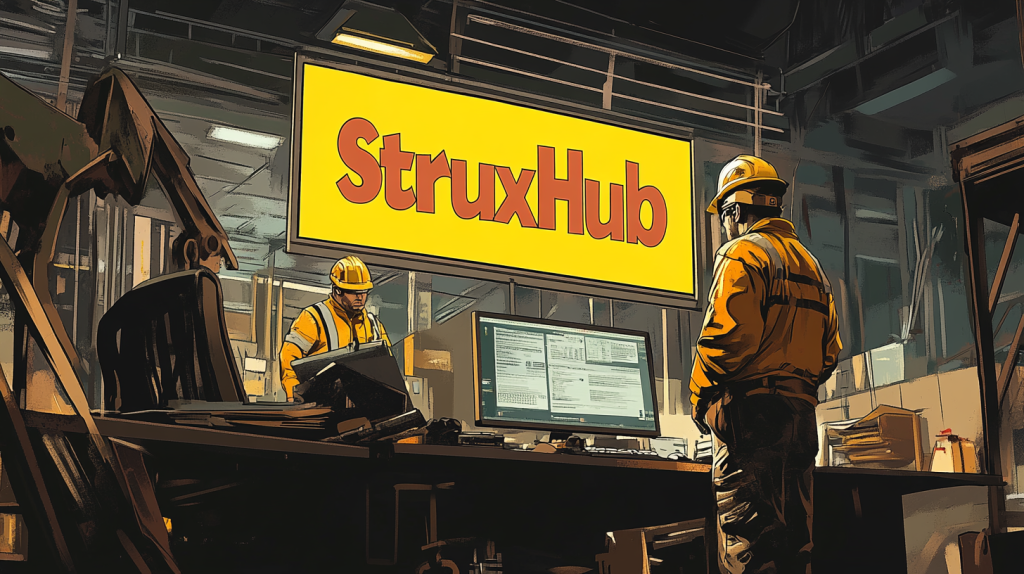
StruxHub
Experience the power of StruxHub today and witness firsthand how it can revolutionize your construction operations.
Unlock the Full Potential of Your Construction Projects with StruxHub
StruxHub enhances efficiency and coordination across all project phases, providing a single source of truth that eliminates silos and fosters collaboration. Real-time updates, financial management tools, and seamless commvunication features ensure that all team members and stakeholders are aligned and informed, reducing the risk of errors and delays. With comprehensive solutions for document management, risk mitigation, and quality control, StruxHub maintains project integrity and safety, while mobile access and integration capabilities further enhance project flexibility and efficiency.
StruxHub’s Key Features and Benefits:
- Advanced Delivery Management: Automate and optimize your delivery schedules, ensuring materials arrive just in time, every time.
- Site Communication: Utilize georeferenced maps and instant messaging to keep every team member informed and aligned.
- Construction Materials Management: Track inventory levels and manage materials procurement with ease, reducing waste and avoiding project delays.
- Construction Safety & Inspection Workflows: Implement customizable mobile forms for conducting safety inspections and managing compliance documentation effortlessly.
- Short-Term Scheduling: Visualize project tasks with detailed floor plans, linking each activity to specific locations for better planning accuracy.
- Construction Resource Management: Efficiently allocate personnel and equipment, maximizing productivity and reducing idle time.
StruxHub’s Product Offering:
- StruxHub Deliveries: Simplifies the coordination of incoming deliveries, ensuring materials and equipment are precisely timed to project needs.
- StruxHub Logistics: Offers intelligent site logistics planning, from crane scheduling to space allocation, for smoother operations.
- StruxHub Safety: Elevates on-site safety standards with easy-to-use tools for inspections, permits, and incident reporting.
- StruxHub Scheduling: Enhances project timelines with intuitive scheduling tools that ensure tasks are completed efficiently and on time.
With StruxHub, construction companies can look forward to a streamlined, more efficient project execution that delivers on time and within budget. Embrace the power of innovation and take your construction projects to the next level.
Don’t miss out on the opportunity to optimize your construction management processes with StruxHub. Sign up for a free demo today. Let’s build smarter, together.
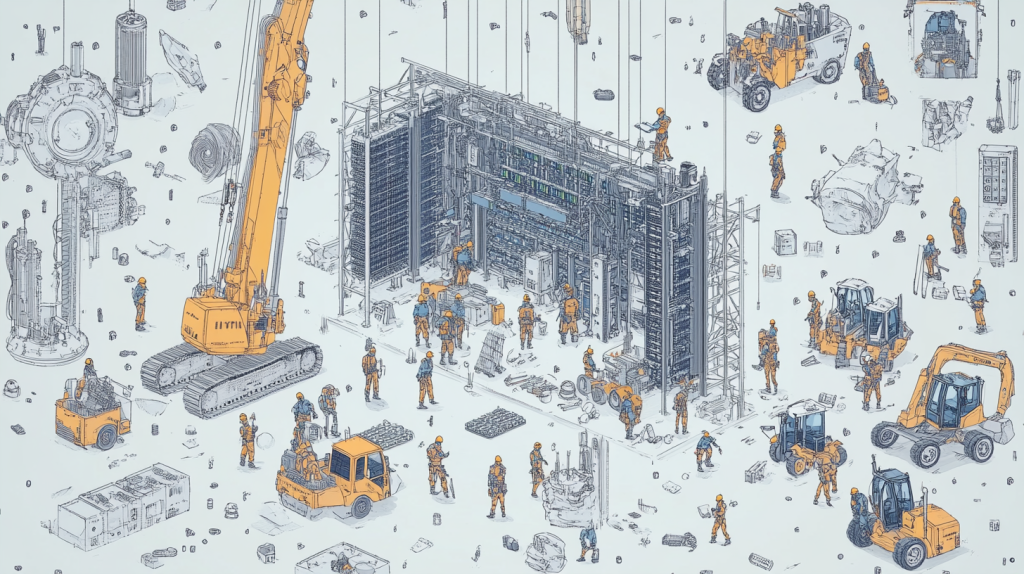
FAQ:
1. How does real-time tracking improve construction delivery management for data center components?
Real-time tracking enhances construction delivery management by providing instant visibility into material shipments, vendor timelines, and delivery status. Data center construction depends on the timely arrival of critical infrastructure components such as power distribution units, cooling systems, and networking equipment. Delays in these materials can cause cost overruns, scheduling conflicts, and operational inefficiencies.
By using GPS tracking, RFID scanning, and automated alerts, project managers can monitor shipments, predict delays, and adjust schedules proactively. This level of oversight allows teams to optimize material staging, reduce bottlenecks, and ensure that essential equipment arrives precisely when needed. Additionally, integrating real-time tracking with construction management software provides data-driven insights that help teams improve procurement efficiency and vendor performance over time.
Having accurate, up-to-the-minute tracking information also enhances coordination between suppliers, contractors, and site managers, ensuring smooth deliveries with minimal disruptions. By implementing real-time tracking solutions, data center construction teams can reduce downtime, avoid unexpected material shortages, and keep projects running on schedule.
2. How does construction scheduling simplify multi-tier timelines for hyperscale data centers?
Hyperscale data center construction involves multiple overlapping workstreams, requiring precise scheduling tools to manage dependencies, resource allocation, and task sequencing. Without an effective scheduling system, project teams risk delays, miscommunication, and inefficient labor distribution.
Construction scheduling software simplifies multi-tier timelines by enabling teams to automate task assignments, integrate material delivery schedules, and monitor real-time progress. This ensures that mechanical, electrical, and IT infrastructure installations occur in the right order, preventing workflow conflicts.
Additionally, scheduling platforms incorporate predictive analytics to help teams identify risks, adjust work sequences, and optimize labor deployment. By aligning construction milestones with procurement and workforce planning, scheduling software enhances project visibility and keeps teams working efficiently.
Using cloud-based scheduling systems, project managers can track multiple data center builds simultaneously, share updates across stakeholders, and minimize costly rework. This level of oversight is essential for keeping hyperscale data center projects on time and within budget.
3. What are the best tools for streamlining construction compliance management in data centers?
Data center construction projects must comply with numerous regulations, including building codes, environmental policies, and safety standards. Managing compliance manually can lead to missed deadlines, fines, and regulatory violations.
Construction compliance software streamlines the process by automating document submissions, tracking approval deadlines, and centralizing compliance records. These platforms help project managers, contractors, and regulatory bodies stay aligned, ensuring that permits, certifications, and inspections are completed on time and in the correct sequence.
By integrating compliance management into construction scheduling software, teams receive real-time alerts when approvals are required, preventing last-minute delays. Additionally, digital compliance tools provide audit-ready records, making regulatory reviews more efficient.
For data centers aiming for LEED certification or meeting industry standards such as ANSI/TIA-942, compliance software ensures that all sustainability and operational requirements are met throughout the construction process. Implementing these tools reduces compliance risks, enhances accountability, and accelerates project completion timelines.
4. How can workforce management software solve coordination challenges in remote data center projects?
Remote data center sites present unique workforce coordination challenges, such as limited connectivity, dispersed teams, and logistical constraints. Managing labor schedules, tracking productivity, and ensuring safety compliance can be difficult without a centralized workforce management system.
Workforce management software addresses these challenges by digitizing scheduling, enabling real-time task tracking, and improving communication between on-site teams and project managers. With mobile-friendly platforms, workers can access assignments, update task statuses, and receive safety alerts even in areas with poor network coverage.
By integrating automated timekeeping, compliance reporting, and labor forecasting, these tools help managers optimize crew allocation, minimize downtime, and reduce inefficiencies. Additionally, digital workforce platforms allow project leaders to monitor job site conditions, enforce safety regulations, and improve worker accountability.
With workforce management software, remote data center projects can enhance productivity, reduce operational risks, and keep construction timelines on track.
5. Why is material tracking essential for efficient data center construction projects?
Material tracking ensures that construction materials, equipment, and components arrive at the job site on time and in the correct quantities. In data center projects, mismanaged inventory can cause delays, cost overruns, and resource shortages.
Advanced material tracking systems leverage RFID, barcode scanning, and real-time inventory updates to monitor shipments from supplier warehouses to installation sites. This helps prevent misplaced deliveries, duplicate orders, and bottlenecks in the construction process.
By integrating material tracking with construction scheduling software, teams can align material deliveries with installation phases, ensuring that equipment such as generators, cooling systems, and networking infrastructure arrives when needed. This minimizes storage constraints and reduces risks of equipment damage due to prolonged exposure to environmental conditions.
Additionally, real-time material tracking improves budget forecasting, vendor performance monitoring, and overall procurement efficiency. Ensuring visibility into inventory levels and supply chain logistics helps data center teams eliminate unnecessary delays and maintain project momentum.
6. How does multi-phase scheduling improve efficiency in hyperscale data center construction?
Multi-phase scheduling is essential in hyperscale data center construction due to the scale and complexity of these projects. Unlike smaller builds, hyperscale facilities require multiple, overlapping construction phases, including foundation work, electrical and cooling infrastructure, and IT deployment. Without proper scheduling, teams risk workflow bottlenecks, resource misallocation, and extended project timelines.
Multi-phase scheduling allows teams to break down the project into manageable segments, ensuring that each phase aligns with overall construction, procurement, and commissioning milestones. By integrating automated scheduling tools, project managers can track dependencies, allocate labor resources efficiently, and adjust workflows in real time.
One of the major advantages of multi-phase scheduling is its ability to prevent costly downtime. When construction phases are not properly sequenced, workers may be forced to wait for critical infrastructure to be completed before they can proceed. This inefficiency increases labor costs and delays operational readiness.
Additionally, multi-phase scheduling software enables real-time adjustments based on supply chain delays, weather conditions, and unforeseen site issues. By dynamically reassigning resources and updating construction timelines as needed, teams can avoid schedule conflicts and maintain continuous progress.
By adopting multi-phase scheduling best practices, data center projects can achieve greater efficiency, reduce costly delays, and improve coordination between vendors, contractors, and installation teams.
7. How can regulatory compliance tools streamline permitting for data center construction?
Regulatory compliance is a major concern in data center construction, as projects must adhere to local, national, and international standards for building codes, environmental impact, and operational safety. Traditional permitting processes can be time-consuming and prone to errors, causing project delays and increasing costs.
Compliance management tools automate the tracking, submission, and approval of permits and certifications, ensuring that teams meet regulatory deadlines without last-minute complications. These tools provide centralized document storage, automated alerts for permit renewals, and real-time compliance monitoring, allowing project managers to stay ahead of evolving regulatory requirements.
A common challenge in data center compliance is navigating multiple jurisdictional requirements. Many hyperscale projects span multiple regions or countries, each with unique environmental and energy efficiency regulations. Compliance software helps teams manage region-specific documentation, reducing administrative burden and ensuring smooth approvals.
Additionally, integrating compliance tools with project scheduling prevents delays by ensuring that required approvals are secured before work begins on critical infrastructure. By using compliance automation, data center construction teams can minimize regulatory risks, accelerate project timelines, and avoid penalties that could impact overall budgets.
8. What workforce management strategies improve efficiency in remote data center projects?
Remote data center projects present significant workforce coordination challenges, as teams are often spread across large geographic areas with limited connectivity and infrastructure. Managing labor schedules, tracking productivity, and ensuring compliance in these environments requires advanced workforce management strategies.
One key strategy is implementing digital workforce management platforms that provide real-time scheduling, task tracking, and mobile communication tools. These platforms allow on-site workers to receive updates, log work progress, and report safety issues, even in areas with minimal connectivity.
Another critical factor is labor resource optimization. Without proper tracking, project managers may overallocate workers to some tasks while leaving other areas understaffed. Workforce management software helps teams predict labor needs, adjust crew assignments dynamically, and optimize workforce utilization.
Additionally, compliance and safety monitoring are crucial in remote locations. Workforce platforms automate OSHA compliance tracking, implement digital safety checklists, and provide emergency alert systems, ensuring that teams adhere to industry regulations while minimizing risks.
By leveraging workforce management strategies tailored for remote projects, data center teams can enhance efficiency, reduce unnecessary labor costs, and ensure smooth execution despite geographic challenges.
9. How can logistics software improve material transportation in data center construction?
Data center construction involves transporting large, sensitive equipment to remote or urban sites, requiring precise logistics management to prevent delays and damage. Logistics software provides project managers with end-to-end visibility into transportation schedules, inventory levels, and vendor coordination, improving overall supply chain efficiency.
One of the primary advantages of logistics software is real-time shipment tracking, ensuring that critical components such as switchgear, UPS systems, and cooling units arrive on schedule. With automated alerts and predictive analytics, teams can anticipate delivery delays and adjust workflows proactively.
Another key function is warehouse and staging optimization. Many data center components require secure, climate-controlled storage before installation. Logistics platforms integrate with RFID tracking and digital inventory systems, helping teams monitor storage conditions and track materials from supplier warehouses to job sites.
Additionally, logistics software improves last-mile delivery coordination, addressing challenges such as restricted access to urban sites, heavy-load transport requirements, and special handling for sensitive equipment. By streamlining transportation planning and reducing shipment risks, data center teams can cut costs, minimize material losses, and maintain construction schedules.
10. What are the benefits of sustainable construction practices in data centers?
Sustainability is becoming a top priority in data center construction, as operators seek to reduce environmental impact while maintaining high-performance infrastructure. Sustainable construction practices help cut energy consumption, minimize waste, and improve long-term operational efficiency.
One key benefit is reduced carbon footprint through eco-friendly building materials, modular construction techniques, and energy-efficient cooling systems. Many data centers now integrate liquid cooling, recycled building materials, and solar power to lower energy use.
Sustainable practices also lead to cost savings over time. By using high-efficiency HVAC and power distribution systems, operators reduce long-term electricity expenses and maintenance costs. Additionally, green building certifications such as LEED and BREEAM improve regulatory compliance and marketability.
Implementing digital tools for energy tracking and waste reduction further enhances sustainability efforts. Smart building management systems analyze energy consumption, optimize cooling performance, and automate maintenance, ensuring ongoing efficiency gains.
By adopting sustainable construction practices, data centers can meet regulatory standards, attract environmentally conscious customers, and lower operational costs while contributing to a greener future.
11. How does advanced construction management software improve hyperscale data center projects?
Hyperscale data center projects demand highly efficient construction management solutions to handle complex scheduling, vendor coordination, and compliance tracking. Advanced construction management software integrates project scheduling, workforce planning, and procurement management into a single system, improving overall project execution.
A primary benefit is real-time project visibility, allowing managers to track milestones, prevent scheduling conflicts, and optimize labor deployment. By using AI-powered analytics, teams can predict potential delays, adjust resources dynamically, and ensure smooth execution.
Another advantage is automated compliance tracking, ensuring that all permits, certifications, and inspections are completed before critical construction phases begin. Digital compliance management reduces risks of regulatory delays and legal fines, keeping projects on schedule.
Additionally, construction management software integrates BIM (Building Information Modeling) and digital twin technology, allowing teams to simulate designs, detect potential issues before construction, and optimize workflows. These innovations help hyperscale projects achieve faster, cost-effective, and more efficient builds.
12. How does efficient scheduling improve the reliability of redundant power systems in data centers?
Redundant power systems are essential for data center reliability, ensuring continuous operation even during outages or equipment failures. However, installing these systems requires precise scheduling to avoid construction bottlenecks, supply chain delays, and installation conflicts with other critical infrastructure.
Efficient scheduling helps teams coordinate the deployment of generators, UPS systems, power distribution units (PDUs), and backup batteries, ensuring that each component is installed in the correct sequence. Without proper planning, delays in one phase—such as switchgear delivery—can create a domino effect, pushing back system commissioning and delaying overall data center operations.
Another key aspect of scheduling redundant power systems is coordinating load testing and failover simulations before the facility goes live. These tests must be integrated into the construction timeline, ensuring that power infrastructure is validated before IT equipment is deployed. By aligning testing phases with project milestones, teams reduce risks of power failures after launch and ensure regulatory compliance with industry standards.
Advanced scheduling software allows real-time tracking of power system installations, flagging potential delays and helping project managers adjust timelines dynamically. By optimizing scheduling workflows, data center teams can reduce downtime risks, enhance system reliability, and accelerate commissioning, ensuring that redundant power systems are fully operational when the facility goes live.
13. How can construction management software enhance collaboration among data center stakeholders?
Large-scale data center projects involve multiple stakeholders, including owners, general contractors, subcontractors, equipment vendors, and regulatory bodies. Without a centralized system for communication and task coordination, misalignment between teams can lead to delays, errors, and costly disputes. Construction management software streamlines collaboration by providing a unified platform where all stakeholders can track project progress, access shared documents, and receive real-time updates.
One major advantage of these platforms is task automation and milestone tracking. Project managers can assign roles, set deadlines, and receive status updates without relying on manual reporting. This eliminates the need for long email threads, redundant meetings, and outdated spreadsheets, keeping everyone on the same page.
Another key benefit is document management. Data center projects require extensive regulatory documentation, including permits, compliance records, and vendor contracts. Construction management software centralizes all documents in a secure cloud-based repository, making it easy for stakeholders to access, review, and update information without delays.
By integrating scheduling, document control, and real-time communication, construction management software enhances transparency, prevents workflow bottlenecks, and ensures that all project teams remain aligned. This leads to faster decision-making, fewer disputes, and more efficient project execution.
14. What are the key factors to consider when choosing a construction management platform for data centers?
Choosing the right construction management platform is essential for improving efficiency, collaboration, and project visibility in data center construction. With many software solutions available, project teams must consider key factors to ensure the selected platform aligns with their needs.
One critical factor is integration capability. The platform should seamlessly integrate with existing project management tools, including BIM (Building Information Modeling) systems, scheduling software, compliance tracking tools, and procurement systems. A well-integrated solution reduces the need for manual data entry and ensures smooth workflows across all construction phases.
Scalability is another important co8586nsideration. Data center projects range from smaller enterprise builds to massive hyperscale facilities, and the software must be capable of handling complex, multi-tier project structures. A scalable solution allows teams to track multiple data center builds simultaneously, manage subcontractors efficiently, and adjust to changing project demands without system limitations.
Security and compliance tracking should also be prioritized. Given the sensitive nature of data center infrastructure, the software must provide robust data encryption, role-based access controls, and secure cloud storage. Additionally, it should include features for automated compliance tracking, ensuring that all permits, certifications, and safety regulations are met.
By selecting a flexible, secure, and well-integrated construction management platform, data center teams can enhance project execution, reduce risks, and streamline operations from planning to commissioning.




